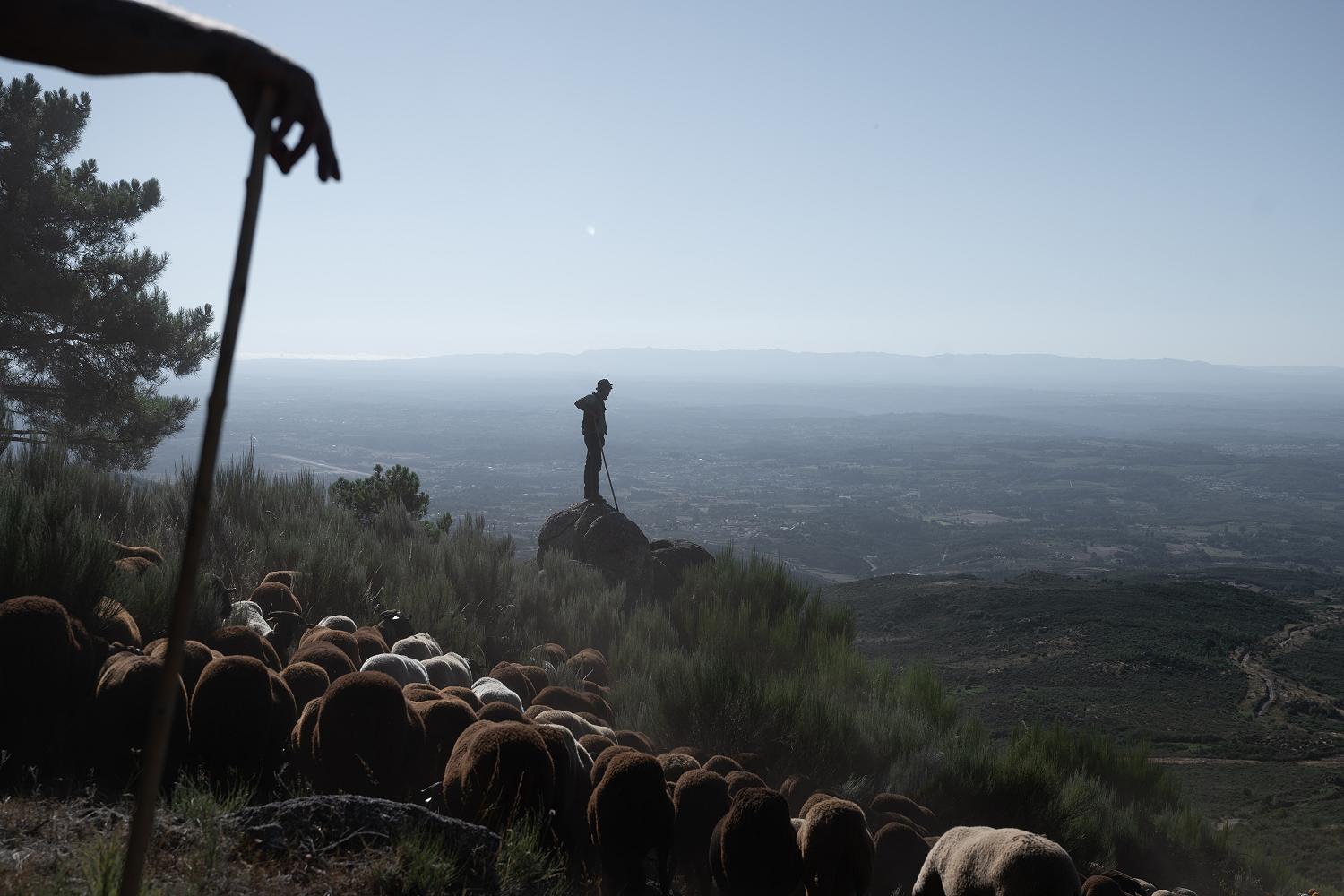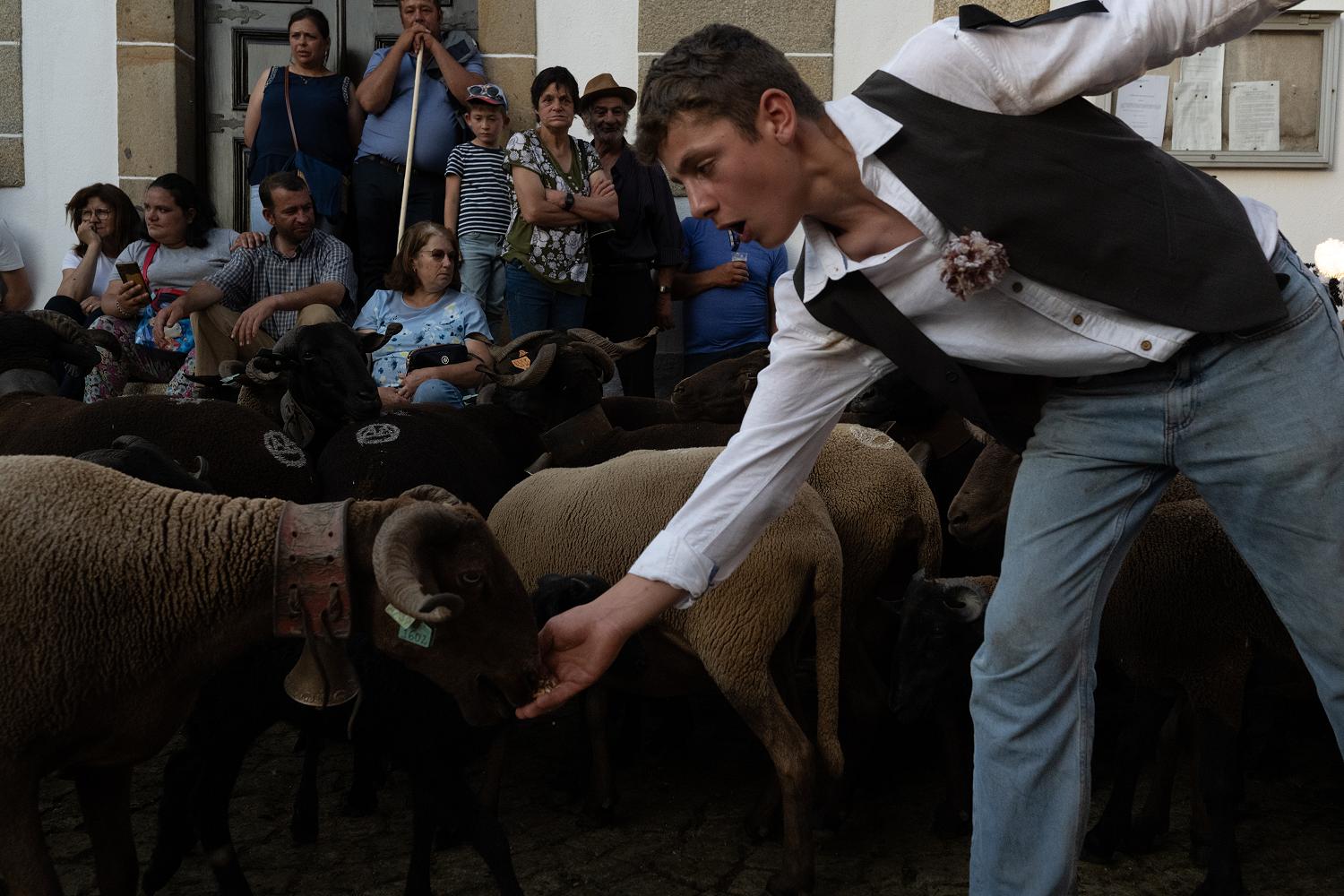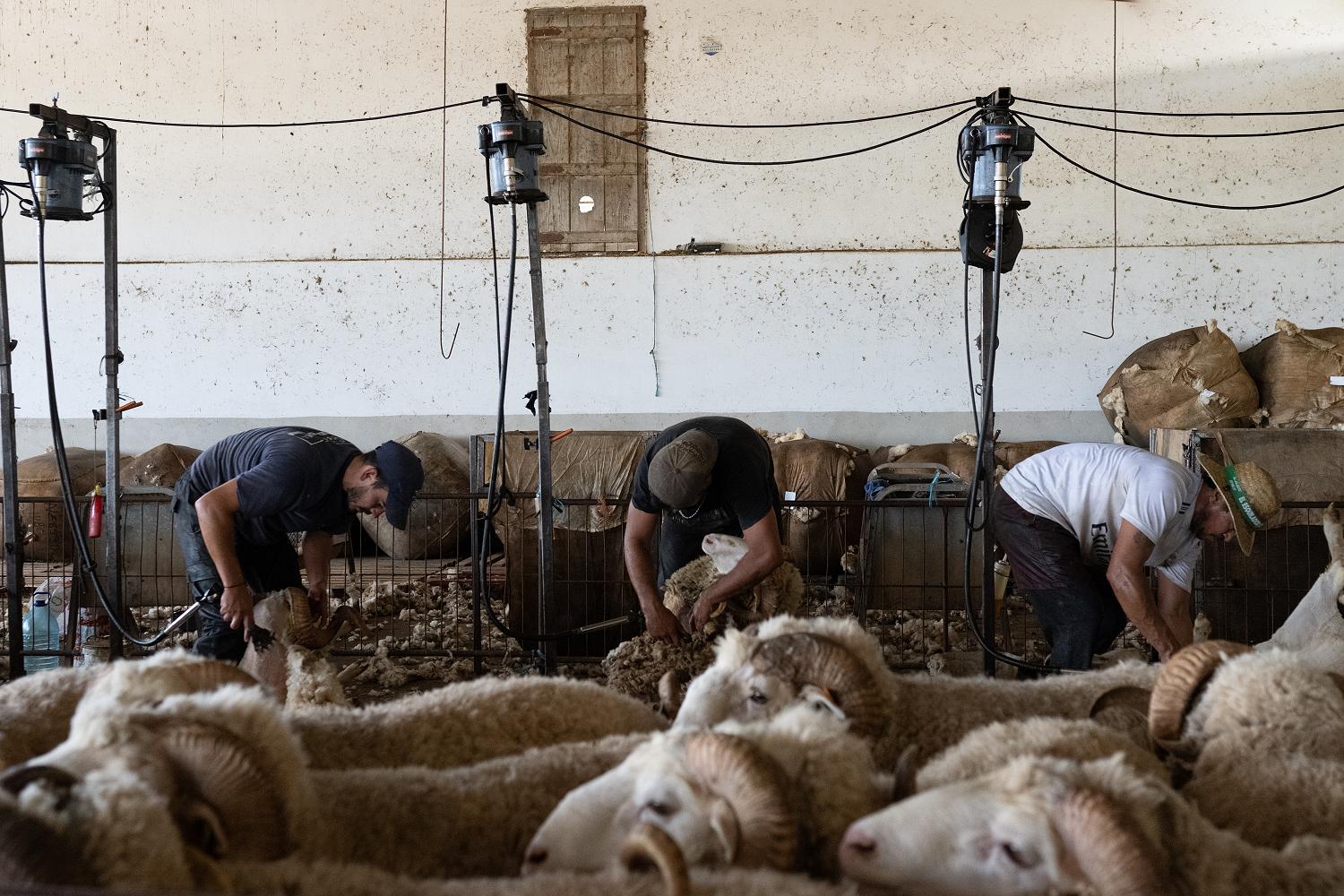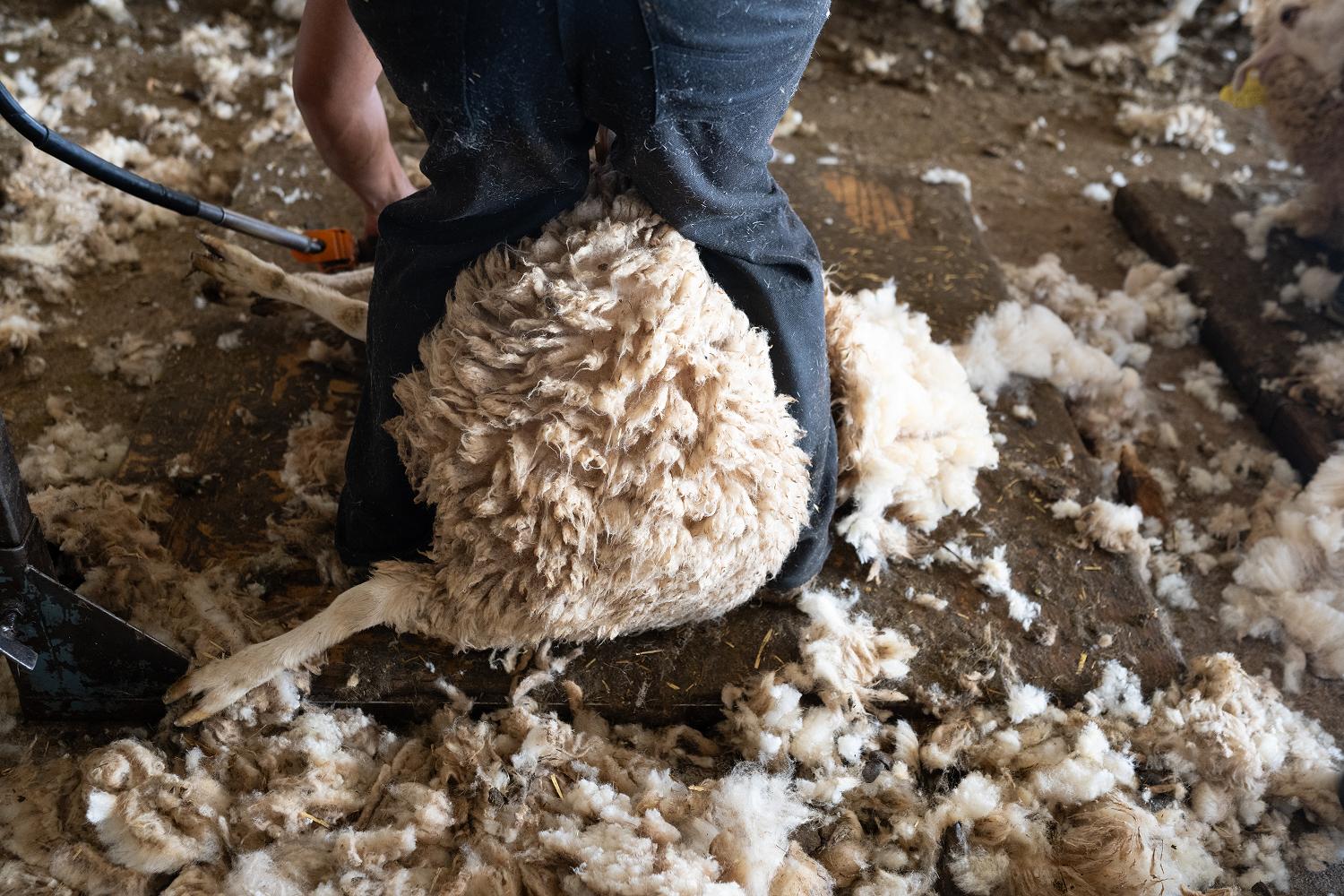As many of you who follow my work know, Portugal is going through a transitional moment – not only within the craft industry but also within the wool sector. I feel it’s important to dive deeper into the ‘what, where, and why’, because it’s a similar story in many other countries across Europe and beyond.
The issue is universal: the wool industry is at risk. And as citizens, consumers, and people who care about the environment and social responsibility, it’s important to share what’s going on.
To better understand the situation, I reconnected with wool historian and advocate Rosa Pomar, who has built a business supporting the Portuguese wool sector. She runs a soulful knit shop, sells yarn, and produces new vests and sweaters at wholesale – focusing on wool from native sheep breeds and involving farmers, shepherds, and manufacturers.
All her efforts are directed toward revaluing this material, supporting the entire supply chain by preserving native Portuguese sheep breeds. This is achieved by transforming their fleece into high-quality yarns that knitters and consumers love to work with.
This month, I delve deeper into the latest news regarding the state of the wool industry in Portugal – what we’re at risk of losing, and more importantly, how we can act.
Photos: Annie O. Waterman
For those who are not familiar, could you please send readers an update on the current state of the wool sector in Portugal and the closure of the scouting facility this spring?
Until this year, Portugal had a large wool scouring facility in operation near Guarda, in the region where most of the country’s wool factories are located. It is a large-scale plant, equipped with modern machinery, that sorts and washes (or is used to wash) not only Portuguese wool but also wool from Spain and other countries. It was the only facility in Portugal providing this service. Sorting and washing are the very first steps wool undergoes after shearing. Industrial spinning cannot take place without first washing the wool. By losing this facility, we lose the autonomy to produce wool-based products in Portugal -- from raw material all the way to the finished piece.
Até este ano, Portugal teve em funcionamento um grande lavadouro de lãs, junto à Guarda, na região em que estão localizadas a maioria das fábricas de lanifícios do país. É um lavadouro de grandes dimensões, com maquinaria recente, que escolhe e lava (ou lavava) não só lãs portuguesas como também espanholas e provenientes de outros países. Trata-se do único lavadouro a prestar estes serviços em todo o país. A escolha e lavagem são as primeiras operações a que a lã é sujeita após a tosquia. Não podemos fiar a lã industrialmente sem a lavar primeiro. Perdendo o lavadouro, perdemos a autonomia de produzir artigos em lã no nosso país, desde a matéria-prima até ao produto final.
What does the closure of this facility mean for brands like yours that source wool locally and for the farmers, shepherds, and the future of this sector?
For my project, the closure of the scouring facility will mean having to send the wool we work with to be washed in Spain – with a significant increase in costs that will inevitably have serious repercussions on our products. Instead of traveling about 180 miles from source to scouring, we will now cover roughly double that distance. For companies already accustomed to washing their wool abroad, this might seem negligible, but it isn’t. It is a major symbolic, political, economic, and environmental loss.
Transporting raw wool (wool that has not yet been washed) is extremely expensive. Sometimes we end up paying more for transportation than for the wool itself, which is absurd.
Of course, I cannot speak on behalf of other companies, but for any brand that wants to work with Portuguese wool, the difficulties and rising costs will be immense. Inevitably, some of them will choose to source wool from other countries where they won’t face the same logistical challenges and additional expenses.
Para o meu projecto, o fecho do lavadouro implicará levar a lã com que trabalhamos para a lavar no país vizinho - Espanha - com um enorme aumento de custos que terá certamente repercussões sérias nos nossos produtos. Em vez de percorrermos cerca de 300km para levar a lã da origem até ao lavadouro, agora vamos percorrer cerca do dobro. Para as empresas habituadas a lavar a lã noutros países esta distância pode parecer irrisória, mas não é. É uma grande perda simbólica, política, económica e ambiental também.
O transporte da lã suja (lã que ainda não foi lavada) é extremamente caro. Por vezes pagamos mais pelo transporte da lã do que pela lã em si, o que é um absurdo.
Naturalmente não posso falar pelas outras empresas, mas qualquer empresa que queira trabalhar com lã portuguesa, as dificuldades e os aumentos de preços vão ser imensos e certamente algumas delas vão optar por trabalhar lãs provenientes de outros países, que não os obriguem ao trabalho e às despesas adicionais.
"The trend in recent years has been one of decline, not only in Portugal but across Europe."
In your opinion, are there other parts of the Portuguese wool processing chain at risk, or is this part of a larger pattern of decline?
The trend in recent years has been one of decline, not only in Portugal but across Europe in general. I don’t think the public is fully aware of this, because we see more and more events and initiatives celebrating European wool. What people don’t realize is that these initiatives are based almost entirely on small-scale projects, usually artistic or artisanal in nature, which – even taken all together – do not carry enough weight to keep factories running. Almost every year we see another wool company in Portugal closing. Only a very small number remain today. Another part of the processing chain now at risk is wool combing. The only company offering this service in the entire Iberian Peninsula is in Portugal, and it too is under threat of closure.
O padrão dos últimos anos tem sido de decadência, não só em Portugal como na Europa em geral. Julgo que o publico não está ciente disso, porque são cada vez mais os eventos e iniciativas a celebrar a lã europeia. Aquilo de que as pessoas não têm noção é de que essas iniciativas assentam quase exclusivamente em projectos de pequeníssima escala, normalmente de natureza artística ou artesanal, que mesmo todos juntos não têm peso suficiente para manter as fábricas em funcionamento. Quase todos os anos vemos fechar em Portugal mais uma empresa de lanifícios, as que sobram são já muito poucas. Um dos outros elementos desta cadeia que está em risco é o da penteação de lãs. A única empresa a prestar este serviço em toda a península ibérica está em Portugal e corre também o risco de encerrar.
Why do you think the municipalities and government haven’t acted to protect this vital industry and fiber?
Wool manufacturing is a sector apart within the textile industry, and it is mostly concentrated in the Serra da Estrela region. In recent years, the municipalities there have centered much of their tourism promotion around this strong cultural heritage connected to shepherding, artisanal cheesemaking, and wool production. But unfortunately, they have not found solutions to problems such as rural depopulation, the shortage of shepherds, the decline in livestock numbers, or the closure of factories. They risk selling tourists an image that no longer corresponds to reality. It is also worth noting that in education, there are no policies designed to attract or channel young people into these fields, where training opportunities are very limited and which families still tend to see as lacking prestige.
On the other hand, I don’t believe wool manufacturing can be protected except within the framework of a broader policy to promote the use of wool in the textile industry. Portugal has a very strong textile industry, capable of attracting clients from all over the world. This industry is involved in international projects and working groups dedicated to sustainability, but strangely, wool is almost always absent from these initiatives. On the rare occasions when it is mentioned, it is never Portuguese or even European wool. What we need is for the Portuguese government (and EU institutions) to promote and reward the use of European wool in textile production, and to stop doing absurd things like presenting “recycled” polyester as a sustainable fiber.
Os lanifícios são um sector à parte dentro da indústria têxtil, e estão maioritariamente concentrados na região da Serra da Estrela. Os municípios desta região têm, nos últimos anos, centrado uma boa parte da sua promoção turística nesta herança cultural muito forte ligada à pastorícia, à transumância, ao fabrico de queijos artesanais e à indústria de lanifícios. Mas, infelizmente, sem encontrar soluções para a desertificação do interior, a falta de pastores, a diminuição do número de cabeças de gado ou o fecho das fábricas. Correm o risco de estar a vender aos turistas uma imagem que já em quase nada corresponde à realidade. Vale também a pena dizer que no ensino não existem quaisquer políticas que atraiam ou canalizem jovens para estas áreas nas quais, aliás, existe muito pouca oferta formativa e que continuam a ser vistas pelas famílias como pouco prestigiantes.
Por outro lado, não acredito que os lanifícios possam ser protegidos sem ser no quadro de uma política global de promoção do uso de lã na indústria têxtil. Temos uma Indústria Têxtil muito forte, capaz de ir buscar clientes a muitas partes do mundo, Esta indústria está envolvida em projectos e grupos de trabalho internacionais dedicados à sustentabilidade mas, incompreensivelmente, a lã está quase sempre ausente desses projectos e, das poucas vezes que é mencionada, nunca é lã portuguesa ou sequer europeia. Precisamos que o governo português (e as instituições da UE) promovam e premeiem o uso da lã europeia na produção têxtil e deixem de fazer coisas absurdas como promover o poliéster “reciclado” como uma fibra sustentável.
As a brand that works closely with farmers, shepherds, and ensures work for all is ethical and fair, are you considering switching to alternative fibers or wool from other countries, or is staying with Portuguese wool a non-negotiable for your brand?
Working with Portuguese wool is absolutely non-negotiable. It has been the focus of our project from the very beginning, and the project would make no sense otherwise. Washing the wool in Spain will bring new challenges and added costs, and it will also make it even more urgent to establish a certification process for origin and traceability of Portuguese wool, so that customers can have guarantees about what they are buying. We already ensure full traceability, with batch identification from the source through every stage of production, but unfortunately in Portugal there is no certification that allows us to communicate this to our customers with the backing of an external authority.
Trabalhar com lã portuguesa é absolutamente “non-nengotiable”. É o foco do nosso projecto desde o início e o projecto não faz sentido de outra forma. Lavar a lã em Espanha trará consigo novos desafios e despesas e tornar-se-á ainda mais urgente conseguir um processo de certificação de origem e rastreabilidade para as lãs nacionais, para que os clientes possam ter garantias sobre o que estão a comprar. Nós temos uma rastreabilidade total, com identificação de lotes desde a origem e em todas as fases da transformação, mas infelizmente em Portugal não existe nenhuma certificação que nos permita transmitir isto aos nossos clientes de uma forma garantida por uma entidade externa.
Let's dream for a moment. If you found the funding, what would your vision for this facility and sector be moving forward?
As for the scouring facility, the ideal scenario would be to secure its viability and bring in someone with the knowledge and drive to modernize its management, attract more clients, and improve its services. I strongly believe this facility could provide an excellent service to European companies interested in working with local wools. There is no other way to achieve true sustainability in textiles than by working within a proximity-based system and with the raw materials we have available locally.
Relativamente ao Lavadouro, a situação ideal seria viabilizar a empresa e trazer à sua gestão alguém com os conhecimentos e a motivação de modernizar a sua gestão, captar mais clientes e aperfeiçoar os serviços. Acredito muito que este lavadouro pode prestar um óptimo serviço às empresas europeias interessadas em trabalhar lãs locais. Não há outra forma de sermos mais sustentáveis no têxtil se não for a trabalhar num circuito de proximidade e com as matérias-primas que temos disponíveis localmente.
"In Portugal, when I was a child, almost everyone still slept under wool blankets. Then came duvets (which people adopted because they are lighter), and now people order “heavy blankets” made entirely of synthetics. Returning to wool sweaters and wool blankets is not a utopia – it simply makes sense."
Are there brands working with wool that are inspiring you today?
There is one deeply inspiring person who has been researching wool across the entire European continent in order to produce a documentary that should be ready next year. His name is Walter Aigner, and he has an exceptional knowledge of this sector. He has been speaking with people working in wool, both at the artisanal and industrial level, all over Europe. Walter believes (and I agree) that the solution to the wool problem must come from institutions finally recognizing in their policies the true cost of using fossil-based fibers.
Walter Aigner on Instagram:
https://www.instagram.com/walteraigner
Há uma pessoa profundamente inspiradora que tem estado a investigar a lã em todo o continente europeu para produzir um documentário que deverá estar pronto no próximo ano. Chama-se Walter Aigner e é um conhecedor profundo do que se passa neste sector, que tem falado com pessoas no sector, tanto a nível artesanal como industrial, em toda a Europa. O Walter acredita (e eu concordo) que a solução para o problema da lã tem de passar por as instituições assumirem finalmente nas suas políticas o verdadeiro preço de usarmos fibras de base fóssil.
"For those who come to Portugal to work with artisans, paying them fairly for their work is the most effective way to ensure these artisans will have followers and apprentices to carry their crafts forward."
What else can we do to help spread the word and share the importance of this story?
Be a more conscious consumer. Buy less, but better and with greater intention. Seek out brands that work with local raw materials and support those projects by sharing their work and choosing their products. In Portugal, when I was a child, almost everyone still slept under wool blankets. Then came duvets (which people adopted because they are lighter), and now people order “heavy blankets” made entirely of synthetics. Returning to wool sweaters and wool blankets is not a utopia – it simply makes sense.
For those who come to Portugal to work with artisans, paying them fairly for their work is the most effective way to ensure that these artisans will have followers and apprentices to carry their crafts forward.
Ser um consumidor mais consciente. Comprar menos, melhor e de forma mais pensada. Procurarmos marcas e projectos que trabalhem com matérias-primas locais e apoiarmos esses projectos divulgando-os e escolhendo os seus produtos. Em Portugal, quando eu era criança ainda quase toda a gente dormia com cobertores de lã na cama. Depois vieram os edredons (que as pessoas adoptaram por serem mais leves) e agora encomenda-se “cobertores pesados” totalmente sintéticos. Voltar às camisolas de lã e aos cobertores de lã não é uma utopia, é o que faz sentido.
Para aqueles que vêm a Portugal trabalhar com artesãos, pagar-lhes de forma justa pelo seu trabalho é a forma mais eficaz de contribuir para que estes artesãos tenham seguidores e aprendizes nas suas artes.
To source Rosa’s products, visit: https://retrosaria.rosapomar.com/
And take a peek at her woolen vests below, available for wholesale.






